Interview: The Cast And Filmmakers Behind True Grit
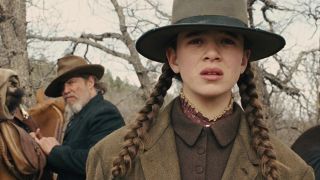
It’s impossible to be surprised anymore when Joel and Ethan Coen put out an incredible film. Writing and directing roughly one project per year, the pair is never tied down to genre or type, instead always making the films that they want to make – and they do it brilliantly. This year’s project was an adaptation of the Charles Portis novel True Grit, and, predictably, they knocked it out of the park.
Earlier this month I was lucky enough to attend a press conference with the cast and filmmakers behind the movie, including the Coen brothers, Jeff Bridges, Hailee Steinfeld, Josh Brolin, Barry Pepper and cinematographer Roger Deakins. Answering questions for all of the hungry reporters, they discussed what its like cutting contractions in the dialect; why Henry Hathaway shot the 1969 version of the story during the daytime; and why Jeff Bridges wears his eye patch on the right eye instead of the left. Check out the press conference with the creators of True Grit below.
Hailee, this is your first big movie, so what was some of the advice that you got from your co-stars during production that you took to heart?
Hailee Steinfeld: I think the best advice that the actors have given me is to not take anything too seriously, but to have fun and… well, take it somewhat seriously [laughs]. But to just have fun with it.
Jeff, Joel and Ethan, you have an iconic character in this movie, but why was the eye patch moved from the left eye to the right eye?
Jeff Bridges: Because I’m a commie [laughs]. No, we put on the right eye, it felt good. We put it on the left eye, not so good. The right eye, “This feels right, what do you think, guys?” And we went back and forth like that.
Joel Coen: I remember going back and forth but I didn’t know at the end of the day that we ended up switching. Someone pointed that out to me recently. Did you know that?
CINEMABLEND NEWSLETTER
Your Daily Blend of Entertainment News
Jeff Bridges: No.
Ethan Coen: We did talk occasionally about switching from eye to eye, scene to scene [laughs].
Jeff Bridges: And sometimes I would forget to put it down for the scene, so I’d be very pleased with the take, and say, “What did you think, guys?”
Ethan Coen: It was great except for the eye patch. There was an early idea discussed, but not for long, to have two eye patches [laughs].
Jeff, did you have any hesitation initially taking on a role that held so much weight?
Jeff Bridges: Well, I was curious why these guys wanted to make that movie again and I think it was Ethan who talked to me first, and he corrected me. He said, “We’re not making that movie, we’re making the book,” as if there weren’t any another movie made, kind of thing. Just referring to the book, and I wasn’t familiar with the book, and he said, “Go check that out, tell me what you think.” And I read the book and I saw what they were talking about, because it’s such a wonderful book and it suited them so well, I thought. And, God, what a great character! Most westerns have that strong, silent type, and here we have this boorish bah-bah bah [laughs]. And it was going to be a lot of fun, I thought.
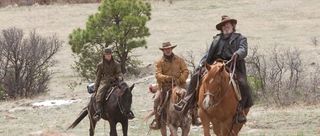
To the Coens, you guys have done plenty of genre movies before, from the screwball comedy to film noir, what about the western specifically did you want to convey, or, for that matter, refute by making this film?
Ethan Coen: I don’t think we thought about it as a genre movie so much, or so much as you might think. It was an interest in the story, Charles Portis’ novel, it is a western inarguably – there are six-guns on horses – but it’s not a Zane Grey story. It’s not a western in that sense. Really we were thinking more about the novel than doing a western, per se.
Can you talk about the challenge of getting those iconic western landscapes filmed? Did you actually film in Arkansas?
Joel Coen: Where did we work? We worked in Colorado, we worked in Utah… Utah originally.
Jeff Bridges: Is there a tax break in Arkansas?
Joel Coen: New Mexico does have a lot of incentives to film there. There was another thing, actually, about Arkansas. The timing that we were filming, we knew that we wanted to have snow in the movie, but the trick was snow, but not too much snow. And we weren’t sure we were reliably going to get any snow that time of year in Arkansas. That actually was a consideration. I don’t think it was the main consideration, but it was one of them. And it was certainly the reason why we moved the show from…
Roger Deakins: Utah and Colorado we were going to get too much snow or we were going to get ten feet of mud at that time of the year. There were a lot of reasons we settled on Santa Fe.
And the importance of capturing those western landscapes for the story?
Ethan Coen: You know, that’s one thing that’s not faithful to the novel. The landscape is a total cheat. But we kind of thought people will think it’s a western and somethings you just can’t mess with. People want that.
Joel Coen: It does go to the whole pictorial idea of the movie where it would have been much different in a place like…
Roger Deakins: It’s really a film about characters, I’m not sure it’s a landscape western in the traditional sense.
Joel Coen: That’s true. It’s about the characters. The honest answer is that it becomes this mish-mash of different considerations that go into where you’re shooting and how you want to treat the landscape. They’re a little hard to sort out after the fact, but everywhere from the practical to just “What does the movie actually want to be about.”
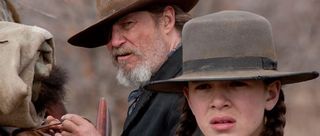
Roger, in working with the Coens for each of their films since Barton Fink you’ve almost become the third Coen brother. What is it about these guys that keeps drawing you back to work with them?
Roger Deakins: They ask me [laughs].
Jeff, at what point did you find Rooster Cogburn?
Jeff Bridges: Each scene is an opportunity to show a different facet of the person you’re portraying. I began developing a character pretty much the same way every time. You’re looking at the script or if you’re lucky enough to have a book, you’re looking at that material and seeing what other characters say about your character, what you say about yourself, what the author says about you. That tells you quite a bit, and then one of the first things you do when you’re hired on to make a film is you work with a costume designer. In this case, it was Mary Zophres who was also the costume designer on The Big Lebowski. That’s one of the cool things about making movies, there’s a collaborative art form so you have all these other artists who are concerned about just specific areas that might be what the room your character lives in, what it looks like and what the clothes look like.
The first people you meet is the costumer because they have to make all those clothes. So Mary has these wonderful books that she brings out and so you look at here’s a hat like this, like this and your character starts to fall in place. You dress as you’re looking in the mirror. There comes a time when the character starts to tell you what it wants and you might prefer, “Oh, this scarf looks nice and the character [pretends to spit],” it won’t stick.
Probably the same thing happens when you’re making a movie too. Sometimes you want to do something, it’s not what the movie wants. There’s a wonderful time when that happens. I’m not sure there’s one particular time it happens. It’s kind of a slow process coming into focus.
Is it too much to say that this film is less a western that a dark comedy? Also, for the actors, can you talk about tackling the dialogue?
Joel Coen: Less a Western than a dark comedy? Well, there’s certainly a lot of comedy, there’s a lot of humor in the Charles Portis novel. It was one of the things that attracted us to the novel and the idea of adapting it. We wanted what was funny about the book, what was the humor of the book to come through in the movie. That was important.
Ethan Coen: And the dialogue too, the formality of it and the floweriness of it also is just from the book. Again, that might be a question for the actors. That was the first thing Jeff mentioned, noticed and liked, the kind of foreign sounding nature of the dialogue and lack of contractions. It wasn’t a problem for us. We just lifted it from the book. I don't know how the actors feel about it.
Barry Pepper: It was more like doing American Shakespeare. There’s almost like an iambic pentameter, a musicality and a rhythm to the dialogue. It’s so specific that you’re working very much with what’s on the page. There’s not endless rewrites throughout production. It’s such a specific script that it’s about trying to hit certain notes, maybe an irreverent falloff at the end of a line and just how you musically sort of… that’s where the brothers were so amazing. It’s such a gift to be able to give some sort of lateral idea to an actor like, “Oh, I didn’t hear the musicality of the line like that.”
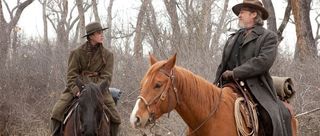
The scene blossoms, completely changes and becomes darkly humorous or odd or quirky or wonderful, bizarre. But it’s a very structured piece I found, in that respect. Charles Portis has such a specific vernacular of the period. It’s so authentic in my mind because most people were probably pretty illiterate back then. They were maybe schooled on the King James Bible and that really infused the way they spoke. I think a lot of westerns missed that.
Jeff Bridges: I agree, he said it perfectly. It was a fun challenge to take on. Every once in a while we’d allow a contraction to slip, if it felt right musically.
Hailee Steinfeld: They spoke for me. When I first got the script that was the first thing I really had to work on was making sure that I understood what everything meant. And then I had to go back through and make sure I understood what everything meant to me emotionally and how I could relate to it in my own life. With the accent, just after getting on set and everyone talking and it kind of happened naturally.
Joel Coen: I have to say, one of the things when we first saw the first take of Hailee doing a scene from the movie, 99.9% of the hundreds or thousands of girls that read for this part didn’t have the facility to… they sort of washed out at the level of not being able to do the language. That was something which was never an issue with Hailee. Right from the beginning it was clear that she was completely comfortable with the language. The language isn’t, as everyone’s pointed out, our language. That was the threshold level at which you could sort of hope to do the part, but Hailee had it right from the get-go in a very, very natural way.
Ethan Coen: I’m sure Barry’s right. You feel even more strongly reading the novel, the frame of reference for her character who narrates the novel as told in first person by her character is King James Bible. It does seem clear that’s where the style derives from.
Josh, where do you have to go within yourself to find a violent simpleton?
Josh Brolin: No stretch. Well, it found me, didn’t it? [laughs] I wasn’t in the film, I don't know what you’re talking about. They just asked to use my name. When I came, I talked to Joel and Ethan about it in the beginning and they said something about he’s sort of a dim bulb and I thought, “No, he’s more like a broken bulb. No filament at all." I like the idea of doing this duality of a guy who he’s talked about throughout the whole movie so when you see him, you expect a monster. Especially when he turns around the first time, that shot with the horses. He’s got that look, whatever he’s doing, I’m not sure what the book is. Then he starts talking and it’s a different kind of guy. It’s like, “So what are you doing here? I don’t understand what you’re doing out here.”
I like that better because it’s different than what you… the mythology of what’s been created from the movie is ripped from you, whatever pigeonhole that you’ve created in your mind of what a sociopath is. And then you see it come back when he’s alone with her. You see that great low shot that they do of that transition that happens of, “I’m not taking this shit anymore” and now I realize I’m out in the middle of nowhere and now I have to manifest this rage again. You realize it’s true, a true sociopath.
It was fun. It was fun to be able to do that. Talking about the language before, we were doing rehearsals. I think a lot of things came together in rehearsals because I don't think anybody really knew how to do the language. Then you see Jeff come in and rarar [laughs]. Then you go, “Oh, I can say mine like that too.” Then Barry comes in and says rarararara [laughs]. Oh, so I can pull off the no contractions by doing that. And it’s true. You do, you do. Then you start to find this, because when I did the voice I thought, “Oh, this is going to stick out so horribly. It’s too much. I think I did too much.” And then I saw everybody else in the film. You don’t even notice it. Did that answer your question?
Jeff Bridges: Don’t forget the bear man!
Josh Brolin: Oh yeah, the bear man! The bear man was like, [really deep voice] “I think that…” [laughs]

Were there things about the original film you admired and wanted to pay homage to or carry through in some small way?
Ethan Coen: Not for us - not the negative either. We’d seen the movie, I think as Joel said, when it came out. But we were kids then. We hadn’t seen it since and only really vaguely remember it.
Roger, Ethan saying that this is not a western notwithstanding, there are western visual elements. How did you approach shooting that and using light sources like campfires and lanterns?
Roger Deakins: It just posed different stipulations for trying to create a realistic look, firelight, oil lamp, night light. The biggest challenge for me was still the big night exteriors, which was a nightmare because you’re out in the middle of nowhere. And really, in this film it’s supposed to be about to snow so therefore there shouldn’t be a moon, therefore there really should be a lot of black space, as you wouldn’t have seen anything. I tried to make it as realistic as possible because I felt that’s what the film was, but at certain times you have to stretch it. At certain times, like for Blackie’s journey then you stretch it into a more poetic kind of thing. For me, whether it was a western or whatever wasn’t important. It was the script and the sense of realism the script demanded, really.
Joel Coen: In one of those nighttime scenes I remember Roger kept coming up to me and Ethan and saying, “You know, in the original film they shot this during the day.”
Roger Deakins: They were lit by firelight and then it cuts to day time and the bad guys arriving. I know why they did that.
For the Coens, you have a great visual style. At what point do the visuals enter your process?
Joel Coen: It really depends. It really depends. There are some places where when you’re writing the script you are thinking a lot about what it’s going to look like. Other times you’re just writing and thinking Roger will figure it out [laughs]. It’s all over the map, honestly.
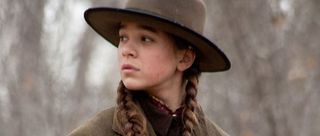
Josh and Hailee, the scene at the campfire was such an amazing scene. How did you prepare?
Hailee Steinfeld: Like 15 minutes after I met you for the first time we were rehearsing that and you were on top of me with a knife to my neck. It was kind of interesting.
Josh Brolin: I don't know how to answer that question, really. She’s so precocious and amazing and present and just kind of went with it. There was never any moment... I think it was more nerve-wracking for me than it was for her. She’s very comfortable in her own skin, you know? That scene was about her talking and being super confident and this little man-child hating the purity of her. Josh loves her purity. He loves it. I’m so taken by her in every which way. I just think she’s incredible, so it was much harder for me.
Everything she did was easy. The rest of us make it really hard, but it was great. I had a really good time. Other than the cursing, between me and Matt [Damon] and Barry, Barry doesn’t curse so much. How much did you earn? I think the F word was $5, the S word was...
Hailee Steinfeld: Every other word was a dollar.
Josh Brolin: She made about $100,000. An incredible experience though. We had a great time. Really, really great time. I can’t really tell you the process because it was a fairly easy process. In rehearsal it was different. We really searched a lot in rehearsal for character and all that, but she had already had it. She was the one person who had it down before the rest of us really started.
How was it being the only girl amongst all of these dudes and how did you learn to shoot a gun? Did you do your own stunts?
Hailee Steinfeld: I did most of them. There aren’t really any, besides the falling down the snake pit. That was the biggest stunt, right?
Ethan Coen: That was the biggest stunt per se, yeah. Hailee did all the riding except some of the riding in the river, but all of the other riding, yeah.
Hailee Steinfeld: So there wasn’t too much of that, but I learned to shoot a gun before I went on location. That was one of the things that I wanted to make sure I had a clue of what I was doing, so I had my dad take me to a shooting range with a friend of ours, who’s an LAPD officer, so he kind of told me everything I needed to know.
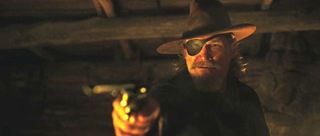
And working with the guys?
Hailee Steinfeld: It wasn’t bad [laughs]. They’re awesome. They’re amazing and I really wasn’t… I was surrounded by women the entire time. The hair and makeup people and wardrobe. My mom was with me, my tutor. So I was surrounded by women the entire time, but I feel like all of them are like big kids so it was a lot of fun.
What kind of research did you do for the story?
Joel Coen: We left all the research to Charles Portis. Obviously, he was very steeped in the period, the language, the periodicals, the weapons, the culture of the period in order to write the novel in such a detailed way. We were happy not to do any work we didn’t have to, basically. That’s from our point of view.
Josh Brolin: I think there’s a couple of things that happens and one is being authentic is really important, but authenticity in place of fluidity seems to... you know what I mean? There’s like, “Wow, that movie is perfect. They didn’t do anything wrong and I’m bored out of my mind.” There has to be a fluidity there and I think that’s what happens in rehearsal when you go, “Yes, you’re authentic. Listen, they wouldn’t have that gun. That’s 1871 and that actually wasn’t issued until 1873.” You’re like, “Are you joking?”
There are a few people out there that really matters to a lot and I do think it’s important, and you have amazing props people like Keith Walters who is extremely wound up about that stuff. That’s great. That’s his job. I love him on the set, but you try to create these composite things. You get in rehearsals and you go, “How does this work?” Even with my character, and I’m not in the movie very much but you go, “Well, what works?” What I came in with wasn’t working at all. We all knew it. There was no damning going on but we were like, “Okay, that doesn’t work, but what do we do?” I don't know. Let’s just keep mixing it up and keep mixing it up.' Then the little voice things comes out and Joel goes, “Oh, what was that?” Ethan goes, “I like that,” or I heard Ethan in the background like [pretends to laugh].” That’s when it comes together. And I think that’s it. Instead of the western, perfect, authentic… this is what they say to do, let’s make it.

Eric Eisenberg is the Assistant Managing Editor at CinemaBlend. After graduating Boston University and earning a bachelor’s degree in journalism, he took a part-time job as a staff writer for CinemaBlend, and after six months was offered the opportunity to move to Los Angeles and take on a newly created West Coast Editor position. Over a decade later, he's continuing to advance his interests and expertise. In addition to conducting filmmaker interviews and contributing to the news and feature content of the site, Eric also oversees the Movie Reviews section, writes the the weekend box office report (published Sundays), and is the site's resident Stephen King expert. He has two King-related columns.
Most Popular





